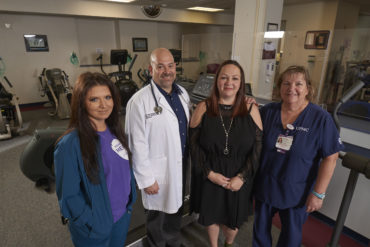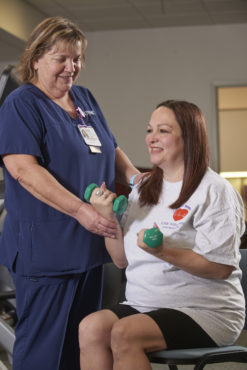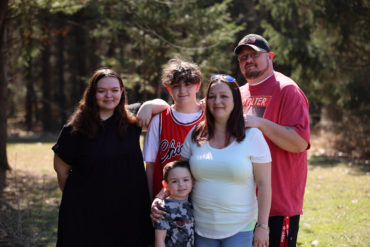The Heart of a Mother
When Jersey Shore resident Jennifer Parker was pregnant with her third child, she experienced conditions similar to those she had experienced with her other two pregnancies: high blood pressure and gestational diabetes. But when Jennifer went to UPMC Williamsport on July 8, 2016, for a scheduled weekly nonstress test, her blood pressure was high — and wasn’t coming down. Despite the fact that she was only 38 weeks pregnant, staff admitted her for an immediate induction. That night, following a complication involving the baby’s umbilical cord, Jennifer’s son Gabriel was born via emergency C-section.
After three days in the hospital, Jennifer went home with her newborn to continue her recovery.
“I was still feeling terrible and things didn’t seem to be progressing or getting better,” she says. “I was constantly vomiting, short of breath, and just overall feeling horrible.”
Before Gabriel was a month old, Jennifer had made three visits to the emergency department at her local hospital in Jersey Shore. Those who treated her offered multiple diagnoses, including postpartum depression, a cold, and pneumonia, but Jennifer didn’t think any of those options told the whole story of how badly she was feeling.
“When Gabe was exactly one month old, I went back to the emergency room yet again,” she says. “This time, they told me that I had a hole in my bowel and that they were going to rush me to [UPMC] Williamsport for emergency surgery.”
The next few hours were a blur for Jennifer as she was transported then sedated in preparation for surgery, but she recalls overhearing something that confused her.
“I remember hearing them say, ‘Did you do the echocardiogram on her?’” she says.
As Jennifer and her family would soon learn, the team at UPMC Williamsport determined that Jennifer’s heart was the underlying cause of most of her symptoms and that she did not require emergency bowel surgery after all. When Jennifer Parker was told she needed a heart transplant, she was desperate for another option. Six years later, she’s back to nearly normal heart function thanks to UPMC Williamsport’s Cardiac Rehabilitation Gym.

“The next day, we found out that my heart was only beating at 10 to 15% [of its capacity]. I was in congestive heart failure. They started me on medication right away — some for the hole in my bowel and some for the heart condition. I also had two blood clots in my heart.”
The next few months were difficult for Jennifer and her family as they worked with UPMC Williamsport’s cardiology team, led by Mohammad Shafique, MD, and including Scott Rosenbaum, PA-C. While medications resolved Jennifer’s bowel condition, her heart condition — postpartum cardiomyopathy — was keeping her from being able to lift her newborn or walk upstairs. For five months, Jennifer had to wear a LifeVest, an external personal defibrillator that monitors the heart and delivers a shock treatment if needed to restore heart function.
Not being affiliated with UPMC at the time, Dr. Shafique referred her to a heart failure specialist in Hershey who told her she needed a heart transplant. Jennifer remembers her shock at hearing the news.
“Our whole world was already crushed, and now it was crushed even more,” she says. “I thought, ‘I’m 36 years old with three children!’ It was a nightmare.”
Desperate to find a path forward that would not require her to undergo a heart transplant, Jennifer sought a second opinion at the Hospital of the University of Pennsylvania in Philadelphia. That’s when she learned that her condition might be treatable with cardiac rehabilitation instead.
“Cardiac rehab is an exercise program monitored by registered nurses and exercise specialists,” Scott says. “They develop programs for people who have had heart attacks, stent placements, bypass surgery, valve replacements, and other cardiac conditions. Individualized regiments help patients recover faster and get back to life quicker.”

Soon, Jennifer was at UPMC Williamsport’s Cardiac Rehabilitation Gym performing the workouts the team had prescribed for her. Although she says the program wasn’t easy, she stuck with it three times a week for 12 weeks.
In concert with her medications, Jennifer’s cardiac rehab exercises — using a treadmill, rowing machine, stationary bicycle, and more — helped strengthen her heart. “
From the time that I started to the time that I finished, I was a completely different person,” Jennifer says. “I could walk longer distances. I could carry Gabriel. My whole life had changed.”
Still, it took hard work — and time — for Jennifer to get back to the nearly normal heart function she has achieved six years later. After finishing her program at the cardiac rehab gym, she continued the exercises she could perform at home and pushed herself daily for more than five years. She says her family — which, in addition to Gabriel, includes her husband, Kerry, and older children Kaylynn, 18, and Aidan, 13 — has served as her support and motivation.
“There was a noticeable change after the initial sessions,” Jennifer says, “but it took longer to get back to feeling like myself. After about two years, I really began to feel the difference, and I begged to go back to work. I still have my good days and bad days, but I am nowhere near where I was six years ago.”
Scott was on the initial consult team when Jennifer arrived at UPMC Williamsport and continues to check in with her every six months. He says that although Jennifer’s recovery from postpartum cardiomyopathy is an extreme case, cardiac rehab is an important part of care for many of his patients.
“It’s a fantastic tool that helps our cardiac patients improve their lifestyles and become more educated about the diseases they have,” he says. “The [nurses and exercise specialists] are wonderful. The patients really love them.”
And the staff members really care about their patients. Robyn Diakite, MSN, a clinician in noninvasive cardiac and vascular testing, recalls an important moment from later in Jennifer’s recovery process.
“There were a few techs who really knew Jennifer well,” Robyn says. “One tech was performing her ultrasound and called another saying, ‘You have to come down here.’ When that tech walked through the door and saw the image on the screen, they just broke down in tears to see the improvement. Everybody was so relieved to know that she was going to get better.”

Today, Jennifer is back at work part time, scheduling appointments for a local home health agency. She says she now has the time and energy to enjoy her family and that Gabriel, now 6, provides her with plenty of opportunities for cardio as she chases him around. Jennifer also continues to do many of the cardiac rehab exercises she learned at the gym, but at home on her own time. She includes her family in her workout activities when she can, taking them out for hikes in nice weather.
Although Jennifer is still on medication for her heart condition, she says life in general is pretty normal. And she credits cardiac rehab with saving her life. For anyone who is considering the therapy based on a doctor’s recommendation, she strongly encourages the approach.
“Do it!” she says, “I know it sounds like a lot of work, and it is a lot of work. But they don’t quit on you. If it wasn’t for cardiac rehab, I don’t know where I would have wound up. I don’t know if I would have ended up having a heart transplant. I feel like [cardiac rehab] saved me.
